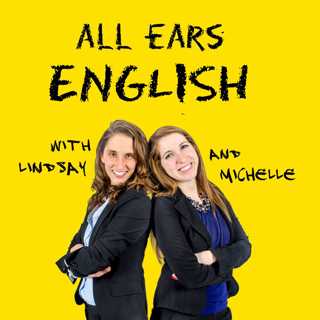
AEE 210: English LingQ Founder Steve Kaufmann Talks About Why Learning is up to YOU
Is learning English up to you? Today, we talk with Steve Kaufmann, founder of English LingQ about how your English learning goals are closer than you think! Come back to our site to learn more Taking IELTS? Get our free IELTS video training now Learn more about your ad choices. Visit podcastchoices.com/adchoices
29 Okt 201417min

AEE 209: Baking Many Cookies with All Ears English
Is it correct to ask how much, or how many in English? Today, in #4 of the Top 15 Fixes series, we discuss using the words 'much' and 'many' when discussing quantities! It’s important to think of the meaning of the words much and many, and how each is used differently in counting. If you're counting something as a mass that can be spilled on the table so that it goes everywhere, you would use the word 'much'. Examples include: Grainy or powdery substances like sugar or flour Liquids, semi-liquids or semi-solids like milk, honey or butter Money (when considered abstractly, as in “too much money”) If you are counting individual pieces, use the word 'many'. Examples include: Grains such as sugar counted individually Groups of items, like chocolate chips, marshmallows or berries Countable units, such as cups, teaspoons or bags Other Entries in the 15 Fixes Series: Episode 165: Listen or Hear? Episode 169: Speak, Talk, Tell and Say? Episode 173: Wish vs. Hope Episode 177: Talking About Age in English Episode 181: Future Tense in English Episode 185: Interested or Interesting? Episode 189: Talking About the Past Episode 193: How to Borrow Money Episode 197: Who Pays for Lunch? Episode 201: Will vs. Going To Episode 205: Talking about People Do you have any examples for using much and many in your baking or cooking? Share with us in the comments section below! Learn more about your ad choices. Visit podcastchoices.com/adchoices
28 Okt 201418min

AEE 208: Amy Gillett Shows You 3 Easy Ways to Speak English Like an American
Do you speak English like an American? Do you wish you did? Today, learn 3 ways to sound a little more like an American when you speak English! Come back to our site for more tips from Amy Taking IELTS? Get our free IELTS video training now Learn more about your ad choices. Visit podcastchoices.com/adchoices
27 Okt 201417min

AEE 207: How to Run Your Day the Right Way
Do you plan for your priorities? Do you run your day, or does your day run you? Today we discuss how planning your day can help you accomplish your priorities! If you don’t decide how you’ll manage you time, someone else will. It’s simple to understand but easy to forget. Come back to our site for more expert tips Taking IELTS? Get our free video training course now Learn more about your ad choices. Visit podcastchoices.com/adchoices
23 Okt 201418min

AEE 206: One Huge Mistake You're Making When it Comes to Missing the Bus
Today we discuss a big mistake you’re making with "miss" and "lose" when you talk about missing the bus in English! Come back to our site for more tips If you take the bus or train, what do you say when you discover it has already come and gone without you? “I lost the bus,” is a common mistake. The problem with saying this is that it suggests you owned the bus, but no longer know where it is. A person can lose their keys or their wallet, but they can only lose their bus if they’re a bus driver! Learn more about your ad choices. Visit podcastchoices.com/adchoices
22 Okt 201413min

AEE 205: How to Fix a Translation Mistake
How do you talk about people in English? Is the word “people” plural or singular? Read the full notes for this episode Today, in #5 of the Top 15 Fixes, we discuss a mistake you might be making when you translate your native language into English – and how to fix it! In some languages, the word for “people” is singular. But it’s important to remember that, in English, this word is plural. People are interesting. NOT: People is interesting. The singular term for “people” is “person.” This is similar to the situation with the words “children” and “child.” The children are good. The children are energetic. The child is good. The child is energetic. Other Entries in the 15 Fixes Series: Episode 165: Listen or Hear? Episode 169: Speak, Talk, Tell and Say? Episode 173: Wish vs. Hope Episode 177: Talking About Age in English Episode 181: Future Tense in English Episode 185: Interested or Interesting? Episode 189: Talking About the Past Episode 193: How to Borrow Money Episode 197: Who Pays for Lunch? Episode 201: Will vs. Going To Have you had trouble with the plural and singular of these words? Does it come from translating from your own language? Let us know in the comments section below! Learn more about your ad choices. Visit podcastchoices.com/adchoices
21 Okt 201414min

AEE 204: 3 Tips for Learning English with an Expert Teacher on iTalki
Would you like advice from an expert English teacher? Today, we talk with Tony from italki.com about 3 outside-the-box ways to improve your English! Come back to our site to learn more Are you taking the IELTS Exam? Get our free IELTS video training course now Learn more about your ad choices. Visit podcastchoices.com/adchoices
20 Okt 201420min

AEE 203: How to Reflect Your Way to English Fluency
Do you take time to reflect on your English learning? Today we talk about how spending 15 minutes on one specific action could save you hours of work later! Come back to our site for more Taking IELTS? Get our free IELTS video training course now Learn more about your ad choices. Visit podcastchoices.com/adchoices
16 Okt 201415min





















